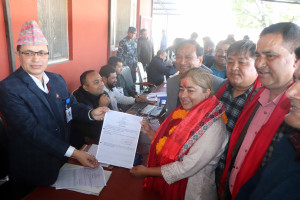Miscellaneous
Mixed reactions in west to 7-state model
Three major parties’ agreement to go for seven provinces with an aim to pacify protests in mid-western and far-western regions has drawn mixed reactions.
Three major parties’ agreement to go for seven provinces with an aim to pacify protests in mid-western and far-western regions has drawn mixed reactions.
Locals of Karnali Zone in the Mid West took out a victory rally on Saturday morning. Jumlis, who were defying the curfew order against the six-state federal model since August 9, hailed the parties’ decision.
“People are celebrating after a separate region was created by splitting Karnali from the far-western province,” said Jumla district Chairman of UCPN (Maoist) Bir Bahadur Kunwar. Their demand for an autonomous region, however, was yet to be addressed.
They have demanded a Karnali province with special rights, action against police officers who fired at demonstrators and free treatment for the injured.
In Rukum, locals from the eastern part have continued their protest against the splitting of the district into two provinces. They asked the parties to justify the move within 72 hours.
The agitating Tharus in the Mid West and Far West continued their stir saying that the major parties did not address their demands. The community has been on the warpath for two weeks demanding a province including Kailali and Kanchanpur districts of the Far West and Banke, Bardiya and Dang districts of the Mid West.
A curfew has been clamped in Kailali since early Saturday to Monday morning after clashes erupted between Tharus and locals supporting an undivided Far West. Police have been mobilised heavily in Tikapur and Dhangadhi in order to avert an untoward situation. At least 13 people including a policeman were injured on Friday in a clash between Tharu activists and supports of the Undivided Far West. The Tharu Welfare Council office in Kailali was vandalised.
Disowning the seven-province model, the Tharus and Madhesis extended their protests programmes by three days in Banke and Bardiya. They accused the top leaders of ignoring the genuine demands raised by the marginalised indigenous community. “The government addressed the demands of Karnali. But the voices of the suppressed community were ignored,” said Joint Tharuhat Struggle Committee coordinator Chandra Narayan Tharu.
More protestors are taking to the street in Banke and Bardiya. Protests turned violent in Banke as the demonstrators clashed with police in Kohalpur and Nepalgunj. In Bardiya, however, markets and shops remained open.
People in Salyan, Surkhet, Mugu, Kalikot, Dolpa, Dailekh and Jajarkot have withdrawn their protests. Rallies were held in the district headquarters in support of the seven-point deal. Politicians and locals in Surkhet welcomed the three-party agreement. They would now hold peaceful rallies to press for Surkhet as the provincial capital. Three people died in clashes with police in the Mid West during their protests earlier.
(With inputs from our local correspondents)




 9.12°C Kathmandu
9.12°C Kathmandu









